US-China Trade War: China May Dump Goods in India - GTRI
By Rediff Money Desk, New Delhi May 14, 2024 22:03
The escalation of the US-China trade war could lead to China dumping goods in India, warns economic think tank GTRI. The US has announced new tariff increases on Chinese imports, potentially affecting India's trade.
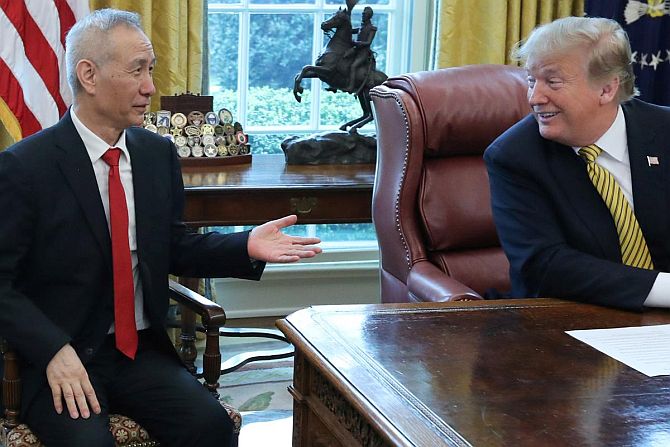
Photograph: Jonathan Ernst/Reuters
New Delhi, May 14 (PTI) The escalation of a trade war between the US and China may push Beijing to dump goods in the Indian markets, economic think tank GTRI said on Tuesday.
In this backdrop, the commerce ministry's investigation arm Directorate General of Trade Remedies (DGTR) has to remain vigilant, it said.
The US on Tuesday reignited the trade war with China by announcing a series of proposed tariff increases on imports including electric vehicles (EVs), batteries, and various other goods.
"The raising of tariff on EVs, batteries and many other new technology items by the US may push China to dump these products in other markets including India," the Global Trade Research Initiative (GTRI) said.
However, it said that higher duties on Chinese face masks, syringes and needles, medical gloves and natural graphite present a significant opportunity for India.
"By ramping up production and export of these in-demand products, India could enhance its trade footprint in the US market," it said adding India may not get any export advantage on remaining products like EVs, and semiconductors as India is the net importer of these products.
The US and EU are taking active measures to cut reliance on China.
With stagnant exports and rising imports from China, India also needs an active China strategy, GTRI Co-Founder Ajay Srivastava said.
During FY2019 to FY2024, India's exports to China remained static at about USD 16.7 billion, while imports surged by 44.7 per cent from USD 70.32 billion to USD 101.75 billion.
"With the routine tariff increases that go beyond the WTO commitments, and large subsidy programmes to ramp up local production, the developed countries are in full protectionist mode, and trade policy gives way to the industrial policy in developed countries including the USA, EU," he said.
Today's proposed increases are a part of the US's broader strategy under Section 301 of the Trade Act of 1974, aimed at combating what it deems as unfair trade practices by China and this includes issues related to technology transfer, cyber intrusions, and cyber theft, the GTRI said.
In 2023, the US imported goods worth USD 427 billion from China and exported USD 148 billion, highlighting a significant trade imbalance.
It added that the US-China trade war involved multiple rounds of tariff increases on a broad array of products.
It effectively started on July 6, 2018, when the US imposed a 25 per cent tariff on USD 34 billion worth of Chinese goods, mainly industrial products like machinery, motors, and electronic components, it added.
By August 23, 2018, the US targeted an additional USD 16 billion in Chinese imports, encompassing electronics, plastics, and railway equipment, also at a 25 per cent duty rate.
The conflict escalated on September 24, 2018, with tariffs extended to cover an additional USD 200 billion of Chinese goods such as luggage and seafood to industrial materials like chemicals and metals, it said.
"The proposed tariff increases exceed the US's bound duty commitments at the WTO, potentially violating WTO provisions. The US has increasingly justified these increases under the rarely used National Security clause," Srivastava said.
The DGTR is an investigation arm of the commerce ministry which deals with anti-dumping duty, safeguard duty, and countervailing duty. These duties are trade remedy measures, provided under an agreement of the World Trade Organisation (WTO) to its member countries.
In this backdrop, the commerce ministry's investigation arm Directorate General of Trade Remedies (DGTR) has to remain vigilant, it said.
The US on Tuesday reignited the trade war with China by announcing a series of proposed tariff increases on imports including electric vehicles (EVs), batteries, and various other goods.
"The raising of tariff on EVs, batteries and many other new technology items by the US may push China to dump these products in other markets including India," the Global Trade Research Initiative (GTRI) said.
However, it said that higher duties on Chinese face masks, syringes and needles, medical gloves and natural graphite present a significant opportunity for India.
"By ramping up production and export of these in-demand products, India could enhance its trade footprint in the US market," it said adding India may not get any export advantage on remaining products like EVs, and semiconductors as India is the net importer of these products.
The US and EU are taking active measures to cut reliance on China.
With stagnant exports and rising imports from China, India also needs an active China strategy, GTRI Co-Founder Ajay Srivastava said.
During FY2019 to FY2024, India's exports to China remained static at about USD 16.7 billion, while imports surged by 44.7 per cent from USD 70.32 billion to USD 101.75 billion.
"With the routine tariff increases that go beyond the WTO commitments, and large subsidy programmes to ramp up local production, the developed countries are in full protectionist mode, and trade policy gives way to the industrial policy in developed countries including the USA, EU," he said.
Today's proposed increases are a part of the US's broader strategy under Section 301 of the Trade Act of 1974, aimed at combating what it deems as unfair trade practices by China and this includes issues related to technology transfer, cyber intrusions, and cyber theft, the GTRI said.
In 2023, the US imported goods worth USD 427 billion from China and exported USD 148 billion, highlighting a significant trade imbalance.
It added that the US-China trade war involved multiple rounds of tariff increases on a broad array of products.
It effectively started on July 6, 2018, when the US imposed a 25 per cent tariff on USD 34 billion worth of Chinese goods, mainly industrial products like machinery, motors, and electronic components, it added.
By August 23, 2018, the US targeted an additional USD 16 billion in Chinese imports, encompassing electronics, plastics, and railway equipment, also at a 25 per cent duty rate.
The conflict escalated on September 24, 2018, with tariffs extended to cover an additional USD 200 billion of Chinese goods such as luggage and seafood to industrial materials like chemicals and metals, it said.
"The proposed tariff increases exceed the US's bound duty commitments at the WTO, potentially violating WTO provisions. The US has increasingly justified these increases under the rarely used National Security clause," Srivastava said.
The DGTR is an investigation arm of the commerce ministry which deals with anti-dumping duty, safeguard duty, and countervailing duty. These duties are trade remedy measures, provided under an agreement of the World Trade Organisation (WTO) to its member countries.
Source: PTI
DISCLAIMER - This article is from a syndicated feed. The original source is responsible for accuracy, views & content ownership. Views expressed may not reflect those of rediff.com India Limited.
You May Like To Read
TODAY'S MOST TRADED COMPANIES
- Company Name
- Price
- Volume
- GTL Infrastructure
- 2.93 ( -4.87)
- 226206286
- IFL Enterprises
- 1.30 (+ 4.84)
- 81461564
- Vodafone Idea L
- 16.79 (+ 0.66)
- 67447398
- NCL Research
- 0.95 ( -4.04)
- 31996628
- Franklin Industries
- 3.73 (+ 3.32)
- 21511209
MORE NEWS

Navi Mumbai Airport ILS Signal Testing Begins
The Airports Authority of India (AAI) has begun ILS signal testing at the...

Air India VRS for Non-Flying Staff Ahead of...
Air India has announced a voluntary retirement scheme (VRS) and voluntary separation...
Fisher Groups Oppose WTO Fisheries Subsidy Talks
Small-scale fisher groups from India, Indonesia, and Bangladesh demand WTO keep...



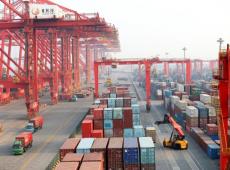
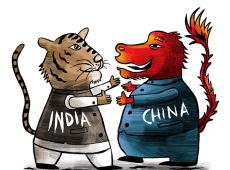


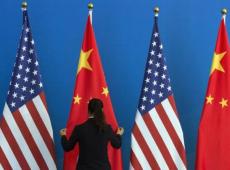
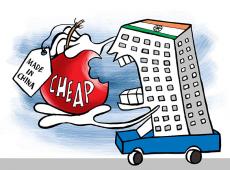



 © 2024 Rediff.com India Limited. All rights reserved.
© 2024 Rediff.com India Limited. All rights reserved.